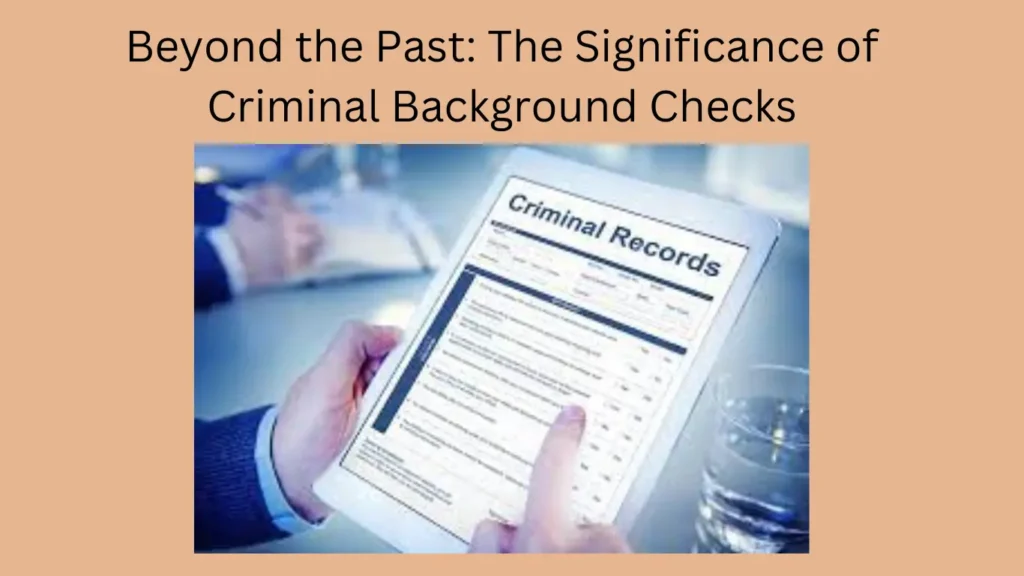Introduction
In the modern hiring landscape, criminal background checks have emerged as a critical tool for employers. These checks provide valuable insights that go beyond a candidate’s resume, helping organizations make informed hiring decisions. This article explores the significance of criminal background checks, their benefits, and best practices for implementation.
The Importance of Criminal Background Checks
1. Ensuring Workplace Safety: Criminal background checks help identify individuals with histories of violent or criminal behavior, reducing the risk of workplace incidents and fostering a safer environment for all employees.
2. Protecting Organizational Reputation: By thoroughly vetting candidates, employers can maintain a trustworthy and reputable brand image, which is crucial for customer confidence and business success.
3. Compliance with Legal Requirements: Certain industries and positions require criminal background checks to comply with legal and regulatory standards. Adhering to these requirements helps avoid legal liabilities and ensures the organization meets its obligations.
4. Enhancing Hiring Decisions: Background checks provide additional data points that help employers assess a candidate’s suitability for a role, ensuring that hiring decisions are well-informed and based on comprehensive information.
5. Reducing Employee Turnover: Hiring individuals with clean backgrounds can lead to lower turnover rates, as they are likely to be more reliable and stable employees. This, in turn, saves the organization time and resources in the long run.
Conducting Criminal Background Checks
1. Obtain Candidate Consent: Before conducting a background check, it’s essential to obtain written consent from the candidate. This ensures transparency and legal compliance.
2. Verify Candidate Identity: Accurate background checks start with verifying the candidate’s identity using official documents like government-issued IDs to ensure the information gathered pertains to the correct individual.
3. Choose the Appropriate Type of Check: Different roles may require varying levels of scrutiny. Basic checks may suffice for some positions, while others might need more comprehensive investigations, such as enhanced checks for roles involving vulnerable populations.
4. Utilize Reputable Background Check Services: Partnering with accredited and reputable background check providers ensures the accuracy and reliability of the information obtained.
5. Review and Interpret Results: Carefully analyze the results, considering the nature and relevance of any criminal records in relation to the job role. Employers should also consider the context and any rehabilitation efforts made by the candidate.
Best Practices for Implementing Background Checks
1. Develop a Clear Policy: Establish a transparent policy outlining the procedures and criteria for conducting background checks. Ensure this policy is communicated to all candidates and employees.
2. Apply Consistently: Ensure that all candidates for similar roles undergo the same level of background checks to maintain fairness and avoid discrimination.
3. Provide a Fair Assessment: Allow candidates to explain any discrepancies or records found during the background check, considering their context and any mitigating factors.
4. Maintain Confidentiality: Handle all background check information with strict confidentiality, limiting access to authorized personnel and storing data securely.
5. Regularly Review and Update Policies: Stay up-to-date with legal changes and industry best practices by regularly reviewing and updating your background check policies.
Conclusion
Criminal background checks play a vital role in modern hiring practices, offering numerous benefits from enhancing workplace safety to ensuring legal compliance. By implementing these checks effectively and ethically, employers can make informed hiring decisions that contribute to a safer and more trustworthy workplace.
For further Inquires Contact Us
FAQs
1. Why are criminal background checks important in hiring?
- They help ensure workplace safety, protect organizational reputation, comply with legal requirements, enhance hiring decisions, and reduce employee turnover.
2. Are criminal background checks legally required?
- In certain industries and for specific positions, background checks are legally required to ensure compliance with regulations and to protect vulnerable populations.
3. How can employers conduct accurate criminal background checks?
- Employers should use reputable background check services, verify candidate identities, obtain consent, and choose the appropriate level of checks based on the job role.
4. What should employers do if a candidate has a criminal record?
- Employers should review the nature and relevance of the record, consider the context, and provide the candidate an opportunity to explain before making a hiring decision.
5. How should background check information be handled?
- Background check information should be handled confidentially, stored securely, and accessed only by authorized personnel to ensure privacy and compliance.
